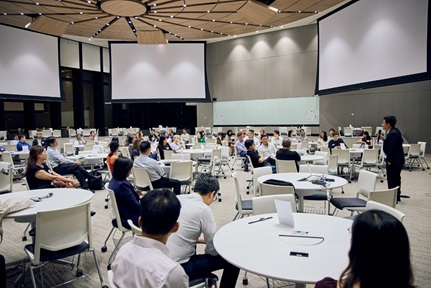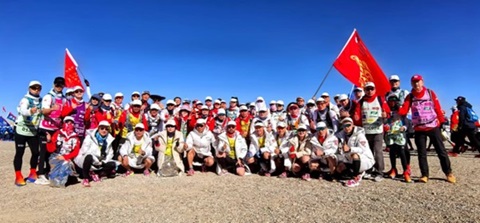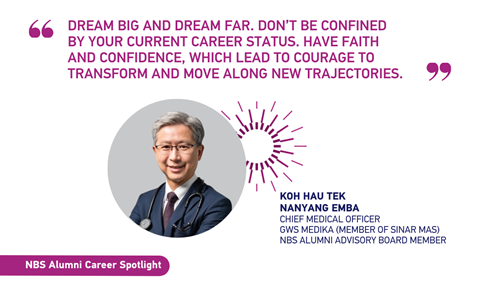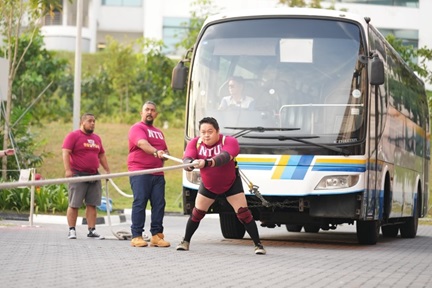Helicopter Parenting 2.0
Adj Assoc Prof and NBS Advisory Board member Abel discusses helicopter parenting – when parents pay extremely close attention to their child's experiences and problems.
Helicopter parenting is a term that describes parents who pay extremely close attention to their child's experiences and problems, particularly in school.
The term was first mentioned by the late best-selling author Haim Ginott in his 1969 book Between Parent And Child. Professor Ginott, who taught at New York University, quotes in his book a teen saying "mother hovers over me like a helicopter".
Over the years, the term has been co-opted by American university administrators to describe the parents of millennial students. Even though these millennial kids were already in university, their baby-boomer parents would continue to call them each morning to wake them up to go to class. If the kids did poorly academically, their parents would file complaints to the university's administration and ask for explanations.
Does this sound familiar?
It appears that helicopter parenting has landed on our shores - parents may find themselves working on children's school projects, shuttling them to endless enrichment classes and taking teachers to task for grades that are not sufficiently good.
The alarming rise of helicopter parenting in Singapore led then Deputy Prime Minister Tharman Shanmugaratnam to warn against it in 2019.
In a speech to educators, he said that helicopter parenting could have long-term psychological side effects on children. Elaborating, he said that helicopter parenting resulted in a "greater sense of anxiety, a loss of a sense of individuality or independence, and greater stress" on children.
He did not blame parents for helicopter parenting as he felt that parents in Singapore just wanted the best for their kids. He believed that parents were "responding quite rationally to the incentives" - the exams, selection systems and entry requirements.
He added that "parents are quite rational; in Singapore, a little risk-averse, so they err on the side of overdoing things".
Mr Tharman's suggestion was that parents should instead set high expectations and support their kids towards meeting those expectations.
The advice he gave is aligned with my family's approach. As parents, my wife and I expect our sons to give their best in whatever they do and learn to take responsibility for their own decisions.
You might call this type of parenting helicopter parenting 2.0 (HP2.0), where the parents are still highly involved but try to give the kids enough space to find their own way.
My wife and I were fortunate to have never sent our sons R, 20, and S, 17, for any tuition except for Chinese, which unfortunately, we were neither competent nor confident to support our kids in.
Rather than nagging the kids to complete their homework, we offered to sit with them each day to support them as they finished their work.
While the kids studied, we often did our work alongside them in solidarity.
To help them build their work ethic, we told them that in the same way adults had a job to go to each day, their "job" as students was to make sure they take full advantage of the learning opportunities at school.
We emphasised to them that it was not the grades that mattered, but the knowledge they were acquiring and the skills they were refining and developing for when they entered the workforce of the future.
Instead of a schedule packed with enrichment classes during the weekend, our HP2.0 approach was to make sure to give the kids a full day of rest each Saturday.
With hectic weekday school schedules, having Saturdays off gave the kids a day to spend on reading, napping or their hobbies.
Sunday was catch-up day. The kids were encouraged to finish up any outstanding homework. The rest of the day was then set aside for them to learn something new, such as programming and music, or an online course in an area that interested them.
When the kids were still establishing their study routines, my wife and I would "hover" nearby to make sure they were not overly distracted and to act as a resource in case they had questions.
As they grew older, we have had to learn to let go and let them take some risks.
A case in point was when R was considering his plans after the O levels. As parents, we made clear to him that he should do his due diligence on what he wanted to study.
After completing his research, R decided that he wanted to go to a polytechnic to study electrical engineering. Even though his grades then would have been good enough for him to go to a junior college, his rationale was that he did not want to study Chinese any longer.
R figured out that he did not need a humanities subject to qualify for polytechnic. So he came to us with a proposal to drop the only humanities subject he was taking at the time. He made the case that doing so would leave him with more time to focus on other subjects more relevant to what he wanted to do in the future.
He further argued that since he was not going to revise the subject for the exam, it would be pointless to go for the O-level exam on the subject.
Having never skipped an exam in our lives, we were quite anxious about his proposal. So we made clear to him that he had no margin for error if he chose to follow through with his plan.
We explained that if he did not qualify for polytechnic studies, there would be no back-up option to go to a junior college, because of the humanities prerequisite for that academic pathway. We stressed that he would have to live with the decision and its consequences.
R assured us that he knew what he was doing, and we took the leap of faith to let him go ahead with his recommendation.
In the end, he had an unrecorded humanities grade on his O-level transcript but made it to the polytechnic of his choice. That was three years ago, and he has since graduated with an electrical engineering diploma.
Letting the kids take more risks has been nerve-racking. My wife and I constantly second-guess ourselves and ask: What if mistakes are made? Can the kids recover? Will we as parents be able to forgive ourselves?
So far, the risks that our kids have taken have not hurt them in any way. On the contrary, they have given them more confidence in themselves and the direction they have chosen to take.
The mystery of parenting is that we never know if we are right or wrong until the kids are grown up.
For my wife and me, the objective of HP2.0 is to try to support our kids as they develop their goals and objectives. We intend to keep trying to give them the space to take the risks they need to take, to go where they want to go.
Abel Ang is the chief executive of a medical technology company and an adjunct professor at Nanyang Business School.
Source: The Straits Times





.tmb-listing.png?Culture=en&sfvrsn=64dc3641_1)
